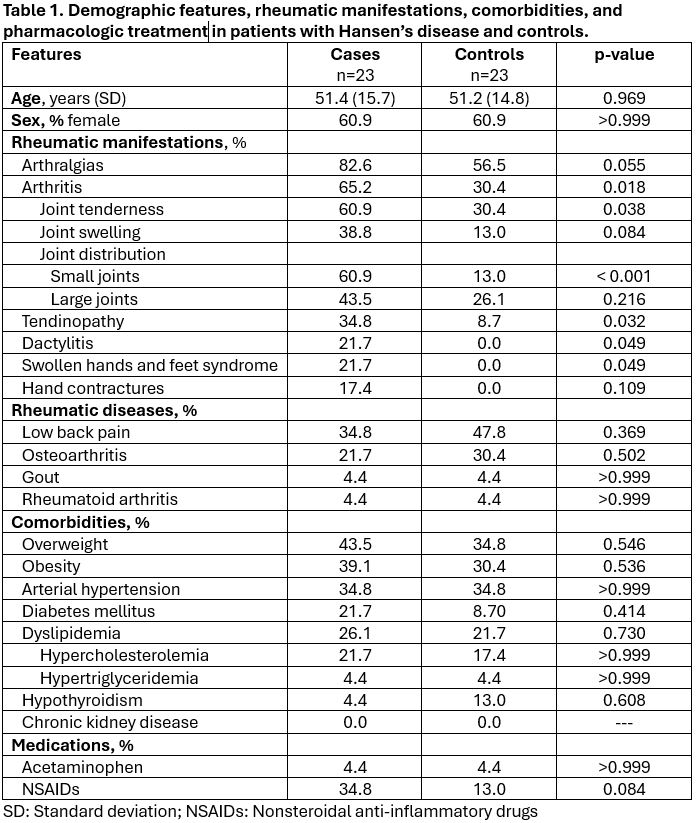Session Information
Session Type: Poster Session A
Session Time: 10:30AM-12:30PM
Background/Purpose: Hansen’s Disease (HD), also known as leprosy, is a chronic granulomatous infection caused by Mycobacterium leprae. A wide range of rheumatic manifestations has been reported in HD, which may occur during the course of the disease or as its initial and sole feature. HD patients are treated with multidrug therapy (MDT) consisting of dapsone, rifampin, and clofazimine for 1-2 years, depending on the leprosy bacillary burden and clinical expression. However, it is unknown whether MDT is effective in controlling rheumatic manifestations. Therefore, we sought to determine the presence of rheumatic manifestations in a group of patients with HD receiving or completed MDT.
Methods: A cross-sectional study was performed with 23 HD patients and 23 non-HD subjects matched for age and sex. HD patients had received < 1year (8.7%), at least one year (8.7%) or had completed (82.6%) MDT. A complete medical history and a musculoskeletal examination were systematically performed for each participant. Demographic characteristics, clinical manifestations, comorbidities, and pharmacologic treatment were ascertained. Data were analyzed using Fischer’s exact test, Chi-square test, or Student’s t test, as appropriate.
Results: The mean age of HD patients was 51.3 years (SD 15.7), and 60.8% were female. Eighty-three percent of HD patients had at least one rheumatic manifestation. A significantly higher proportion of patients with HD had arthritis (particularly of small joints), tendinopathy, dactylitis, and swollen hands and feet syndrome compared to controls (Table 1). The most affected joints in HD patients were the proximal interphalangeal joints (60.9%), metacarpophalangeal joints (52.2%), metatarsophalangeal joints (39.1%), and distal interphalangeal joints (34.8%). The most common tendinopathy was rotator cuff tendinitis (26.1%).
Conclusion: This study suggests that a high proportion of HD patients continue to experience rheumatic manifestations despite receiving MDT. Recognizing that rheumatic manifestations may pose a significant burden on the functionality of these patients is crucial. Increased awareness of this issue can help in offering better treatment options or exploring alternative therapies.
To cite this abstract in AMA style:
Gil De Rubio Cruz P, Lastra-Annexy A, Pelet Del Toro N, Vilá L, Quintero-Noriega A. Rheumatic Manifestations in Patients with Hansen’s Disease Treated with Multidrug Antibiotic Therapy [abstract]. Arthritis Rheumatol. 2024; 76 (suppl 9). https://acrabstracts.org/abstract/rheumatic-manifestations-in-patients-with-hansens-disease-treated-with-multidrug-antibiotic-therapy/. Accessed .« Back to ACR Convergence 2024
ACR Meeting Abstracts - https://acrabstracts.org/abstract/rheumatic-manifestations-in-patients-with-hansens-disease-treated-with-multidrug-antibiotic-therapy/

